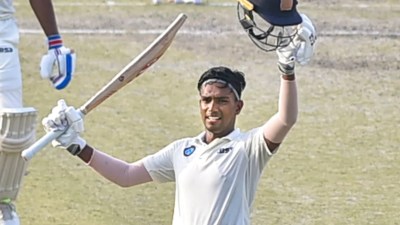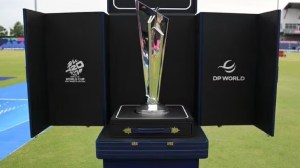On July 8 last year, the Delhi Chief Secretary sent a five-page report to Lieutenant Governor (LG) Vinai Kumar Saxena and Chief Minister Arvind Kejriwal, flagging “deviations” from laid-down procedures in the formulation of the (now withdrawn) Delhi Excise Policy 2021-22.
Based on the Chief Secretary’s note, the LG asked for a detailed report by the Vigilance Department. The report, submitted on July 20, alleged that “arbitrary and unilateral decisions” by Manish Sisodia in his capacity as Excise Minister had resulted in “huge financial losses to the exchequer”, and that “kickbacks…received by the AAP Delhi government and AAP leaders” were used to “influence” the Assembly elections in Punjab and Goa in early 2022.

On July 22, Saxena recommended an investigation by the CBI, and Sisodia was arrested on Sunday night. The Delhi government has maintained that the policy was aimed at improving the experience of buying liquor in the city, and at allowing Excise to reach its full revenue-generating potential.
The main allegations in the Vigilance Department’s report — on the basis of which the CBI has built its case — include:
Delhi liquor policy: Discounts, ‘1+1’ schemes
The report said that “hefty discounts” being offered by liquor retailers were causing “severe market distortions”, and that licensees were issuing advertisements and promoting liquor and their shops through various means.
According to the report, the Excise Department had allowed a 25% discount, allegedly on the basis of a note issued by Sisodia on April 1, 2022. This, the report said, showed “active interference” in the free market policy approved by the Council of Ministers, and subsequently, by the then LG.
 Manish Sisodia is taken away from the court on Monday. (Express Photo: Praveen Khanna)
Manish Sisodia is taken away from the court on Monday. (Express Photo: Praveen Khanna)
Number of dry days
The new excise policy reduced the number of dry days from 21 in the 2021 calendar year to three in 2022, allegedly without approval from the Council of Ministers, and without seeking the LG’s opinion. The report noted that while the Excise Department had compensated liquor vends for the forced shutting due to the pandemic (see below), it had chosen to not levy additional licence fees for the larger sales arising out of the “substantial reduction in number of dry days”.
Story continues below this ad
The report flagged the apparent reversal of Sisodia’s earlier policy on dry days. It recalled that on December 4, 2015, the assistant commissioner of the Excise Department had suggested that the number of dry days be cut to three from 23, which would bring Delhi’s excise policy in line with that of Uttar Pradesh and Haryana, and deter the smuggling of liquor into Delhi.
On December 11 that year, Sisodia had, “without assigning any reason”, overruled the proposal to cut the number of dry days. However, on January 6, 2021, he had approved the same proposal in the Delhi Excise Policy 2021-22, the report said — “without even taking approval of the Council of Ministers”.
Senior government officials pointed out that Delhi’s liquor policy could not have been in consonance with UP’s or Haryana’s because the Delhi government does not have control over land and police in the capital. In fact, one of the legal undoings of the scheme was the opening of liquor vends in non-conforming areas in violation of the Master Plan for Delhi, 2021.
Extension of licences
The report said that the licences issued to liquor retailers were extended from April 1, 2022 to May 31, 2022, and then from June 1, 2022 to July 31, 2022, without the approval of the Council of Ministers and without seeking the LG’s opinion.
Story continues below this ad
Such extension, allegedly given by Excise officials on their own, “without any increase in the tendered licence fee”, contravened a proposal approved by the Council of Ministers on June 23, 2021, which said that the licence fee “may be increased” at the end of 2021-22 “after considering the real time-based actual sale data”.
According to the report, “no such exercise was undertaken by the officers of the department”, and the extension of the licence period without an increase in fee prima facie led to “undue benefit” to the licensees without “any justification”.
 Manish Sisodia ahead of appearing before CBI officers for questioning in connection with the excise policy case. (Express Photo: Prem Nath Pandey)
Manish Sisodia ahead of appearing before CBI officers for questioning in connection with the excise policy case. (Express Photo: Prem Nath Pandey)
Waivers, licence fees
The report flagged the “blanket relaxation” given by the Excise Department in case of default in the payment of licence fees, which was allegedly approved by Sisodia without the concurrence of the Council of Ministers and the LG. It said licence fees worth Rs 144.36 crore were waived in January 2022 “on pretext of COVID restrictions as relief to the Liquor Cartel”.
According to the report, liquor licensees had first approached the Delhi government for a waiver and, after receiving no response, moved the Delhi High Court. On January 6, 2022, the court directed them to file a fresh representation, and asked the Excise Department to decide within seven days.
Story continues below this ad
On February 1, Sisodia had directed the department to provide “pro-rata license fee relief to each licensee” for closed vends during the period December 28, 2021 to January 27, 2022, even though there was no “enabling provision in the tender document to provide any such compensation/ license fee waiver…”
This, the report said, was done despite the Accounts Branch of the Excise Department having specifically recommended on February 25, 2022 that no compensation should be allowed to licensees.



 Manish Sisodia is taken away from the court on Monday. (Express Photo: Praveen Khanna)
Manish Sisodia is taken away from the court on Monday. (Express Photo: Praveen Khanna) Manish Sisodia ahead of appearing before CBI officers for questioning in connection with the excise policy case. (Express Photo: Prem Nath Pandey)
Manish Sisodia ahead of appearing before CBI officers for questioning in connection with the excise policy case. (Express Photo: Prem Nath Pandey)




































